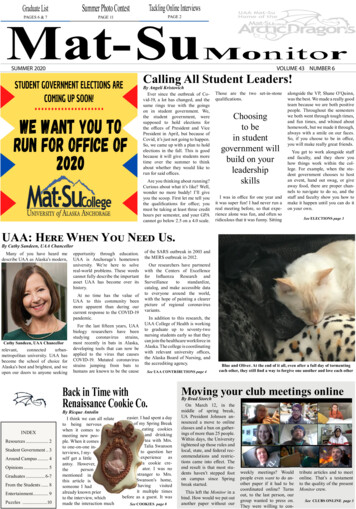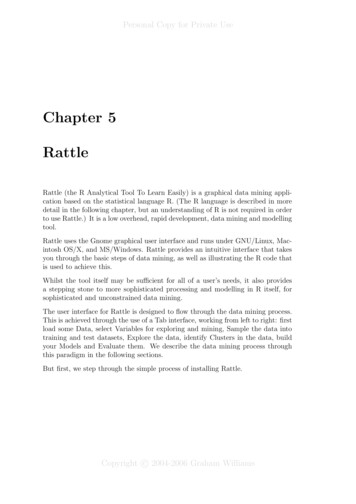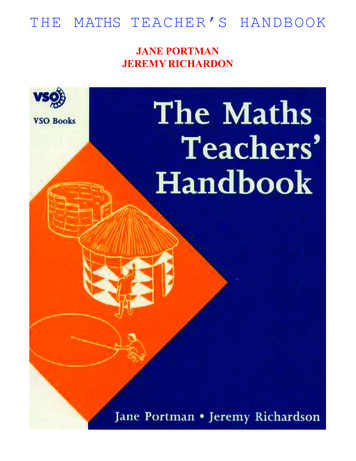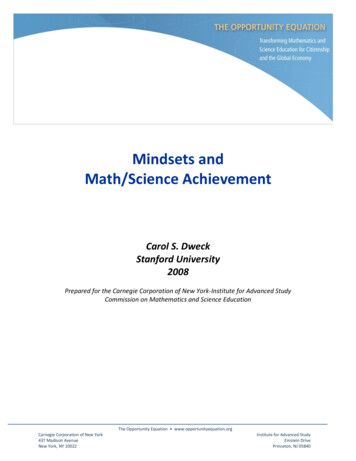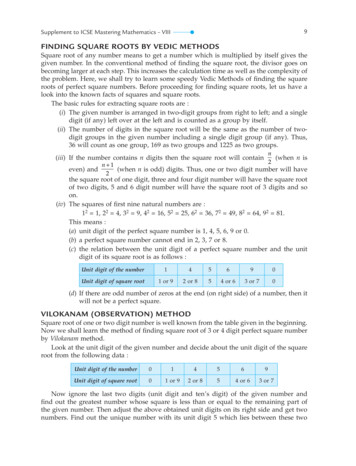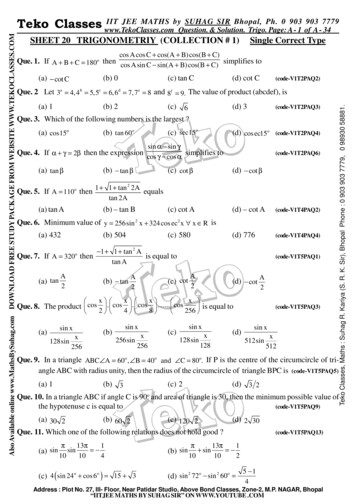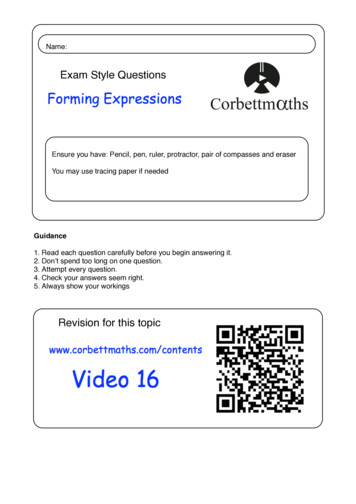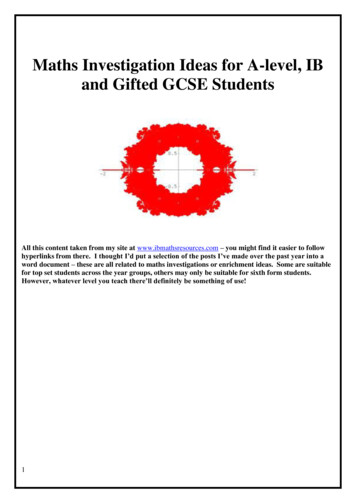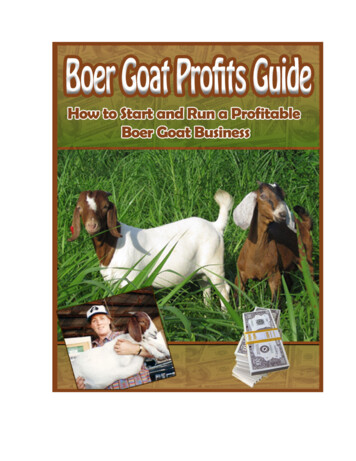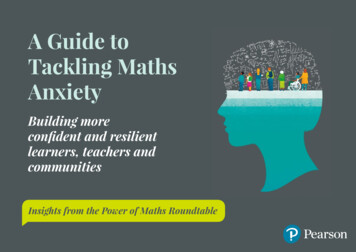
Transcription
A Guide toTackling MathsAnxietyBuilding moreconfident and resilientlearners, teachers andcommunitiesInsights from the Power of Maths Roundtable
The Power of Maths Roundtable SeriesAt Pearson, we believe in the power of maths.It’s an integral part of the world around us.That’s why everything we do focuses onbuilding skills and confidence in maths soeveryone can engage with opportunities,achieve, and progress throughout their lives.As we cannot effect such great change alone,our Power of Maths Roundtable series bringstogether leading influencers across education,academia, industry and the third sector todiscuss and unlock contemporary issues facingmathematics in the UK today.Putting the spotlight on tackling maths anxietyMaths anxiety affects thousands of children, young people and adults inthe UK. Seen and felt in classrooms, homes and workplaces across thenation, it is widely acknowledged as a barrier to engagement and progressin maths, as well as other areas of education, employment and life.Our second Roundtable brought teachers, academics, charity andbusiness leaders together to explore how to tackle maths anxiety. Thisguide draws upon the insights and practical tips gathered at the eventso you can join us in helping build more confident and resilient learners,teachers and communities. #PowerofMaths 2
ContentsForeword4Maths anxiety: the headlines5Solutions at the chalkface8Understanding and identifyingmaths anxiety9Tools to support maths-anxiouslearners13Rethinking teaching approaches16Join the conversation #PowerofMaths Solutions beyond the school gates20Challenging perceptions andbroadening horizons21Engaging adults and boostingmaths confidence24Conclusions26Further reading andacknowledgements27303
1ForewordThe average person on the street may not have heard of the term ‘maths anxiety’, butit is likely they or someone they know will have suffered from it.Having been a student in the classroom myself and now on the other side of the deskas a classroom teacher, I have witnessed how maths anxiety can negatively impactthe competence and confidence of people in dealing with maths. This can sadly harmtheir ability to engage with maths for their rest of their lives.While academic discussions around maths anxiety began to appear in the 1950s, itis a concept that has been expressed for centuries. An Elizabethan nursery rhymewritten by Scottish mathematician John Napier, dating back to 1570 even read:“Multiplication is vexation, division is bad. The rule of three doth puzzle me,and practice drives me mad.”1As someone who advocates the magic of numbers, it was therefore a privilege andhonour to chair Pearson’s Power of Maths Roundtable, where leading academics,business leaders, teachers and educators came together to discuss how we cantackle this long-standing and significant issue.By Bobby SeagullMaths teacher, author and TV presenterChair of Pearson’s Power of Maths Roundtable #PowerofMathsThe Roundtable showed there are many driven people and organisations who arecommitted to building a more confident and resilient nation when it comes to maths.And this guide gives an insight into some of the solutions and ideas that can be takenforward in schools and wider society to help make this vision a reality.Change can and will happen, but society will not transform overnight. Together, wemust continue the conversation and fight for the wonder of maths. 4
12Maths anxiety: the headlinesWhat is maths anxiety?Mathematics anxiety has been defined as:A feeling of tension and anxiety that interferes with the manipulationof numbers and the solving of mathematical problems in ordinary lifeand academic situations.Richardson and Suinn (1972)2It is a negative emotional reaction to mathematics that acts as an ‘emotionalhandbrake’ and holds up progress in maths. The severity can range from a feeling ofmild tension to experiencing a strong and deep-rooted fear of maths.Maths anxiety is not always obvious: it can sometimes be invisible and often unnoticed.It can manifest itself as poor behaviour, anger, frustration, avoidance, under-attainmentand helplessness.Definition by Sue Johnston-WilderAssociate Professor, University of WarwickLeading academic into mathematics anxietyand developing mathematical resilience #PowerofMathsIt doesn’t begin or end within the school walls either: it affects children through to theelderly, presenting in homes, classrooms and workplaces. In schools, it spans across theattainment spectrum, from high-flyers to those who find the subject more challenging.Research suggests that the majority of those who experience maths anxiety areusually learners with a ‘feeling’ rather than a ‘thinking’ preference, otherwise known asempathisers.3 These learners prefer to understand the value, meaning, purpose andnarrative of the mathematical tools they are required to learn. 5
2Maths anxiety: the headlines1 in 1036%of 15–24-year-oldsin the UK feel anxious about maths 51 in 5parents suffer fromarithmophobia –a fear of numbers 868 37521eight to 13-year-oldsin Britain suffer frommaths anxiety 4Mathsanxietyin numbers1 in 4parents don’t feel able toteach their children basicaddition and subtractionwithout a calculator 940%of parentsWomen are morethan twice as anxiousas men about usingmaths and numbers 7 #PowerofMathsOnly26%wouldn’t be able to showtheir children how to split arestaurant bill with friends 10of undergraduatestudents have the numericalskills and understandingnecessary for daily life and work 6 6
2Maths anxiety: the headlinesWhat causes maths anxiety?Maths anxiety has many possible causesand contributing factors that are currentlybeing researched.We all have curious brains that have anin-built, highly-tuned safety mechanismthat protects us so we can avoid danger.And when faced with a perceived ‘danger’,we have a ‘fight or flight response’.When it comes to maths anxiety, the sameprinciple applies. If faced with a task thatrequires maths, many could perceive‘danger’ to be:social threats – such as humiliation,exclusion and being left behind orisolatedfear of failure – being asked to dosomething the learner experiences astoo hard through insufficient scaffolding,context, meaning or narrative.Research has shown so far that these arecommon contributing factors to mathsanxiety across different ages and stagesof life. #PowerofMathsIn schools, many students reportexperiencing maths anxiety as a resultof finding the work difficult, competingwith peers, gender bias and insensitivityfrom teachers, and lack of remediation.11Beyond the school gates, being askedto work out a share of a bill, help withhomework or answer a quick-firequestion involving maths in front ofothers can commonly invoke panic andanxiety for people of all ages. The good news isthat maths anxietycan be tackled.With the right toolsand commitment,everyone canbuild confidenceand resiliencewhen it comes tomathematics.7
3Maths anxiety: solutions at the chalkfaceAs part of our Power of Maths Roundtable, attendees were not onlyasked to discuss the causes and extent of maths anxiety, but also howwe can tackle this issue.At the Roundtable Elsie, aged 13, shared her experience of overcomingmaths anxiety to help our search for solutions.I was bad at maths and I didn’t understand it, so I got frustratedand upset. It made me feel a bit dumb and stupid – like I was bad ateverything, so I gave up on my other subjects too.I was put into a smaller group with other kids who struggled with mathsand I also had one-to-one time with a specialist teacher. She told methat I wasn’t bad at maths and that I’m not stupid. I was given ways tostop feeling frustrated and she showed me fun activities involving maths.I still struggle with some areas of maths but I don’t give up. To childrenwho are experiencing maths anxiety now, I’d say: don’t give up, ask forhelp and don’t let it affect your other subjects.Elsie, aged 13Inspired by Elsie’s story, Roundtable attendees shared their tipsand strategies to help prevent and treat maths anxiety in schoolsand colleges. #PowerofMaths 8
3Maths anxiety: solutions at the chalkfaceWithin schools and colleges, teachers andleaders are vital to preventing, tackling andtreating maths anxiety. They can help identifystudents who are suffering from mathsanxiety and ensure tools and approaches arein place to help.Building on 60 years of research into the area,there’s still much more we can do to improveour approaches to maths anxiety in schoolsand colleges.So how can we do this? Roundtable attendeeshighlighted three key areas in their search forsolutions Understanding andidentifying maths anxietyTools to support mathsanxious learnersRethinking teachingapproaches #PowerofMaths 9
3Understanding and identifying maths anxietyTraining and CPDRoundtable attendees highlighted theimportance of more training and CPD inhelping teachers and leaders understandand identify maths anxiety. RecommendationInitial Teacher Training inthe UK, as well as in-schooltraining, should includeexploring maths anxiety. RecommendationEvery opportunity to raiseawareness of the issue canmake a difference – be itrunning focused CPD with staffdrawing on the likes of theCambridge Espresso researchdigests on maths anxiety, orputting the definition of mathsanxiety on a board in thestaffroom.RecommendationSupport Early Years professionals to develop ‘maths talk’ by introducingmathematical concepts and language in a way that young childrenalready understand, such as through discussing ‘sharing’ and ‘fairness’.This was considered an important starting point in helping to normalisemaths and help prevent future anxiety. #PowerofMaths 10
3Understanding and identifying maths anxietyPupil and teacherquestionnairesAs no two schools or colleges are thesame, it’s important for leaders andteachers to understand the issue intheir own context.A teacher’s perspective:West Lakes Academy Research ProjectRob Brown, a maths teacher at West Lakes Academy in Cumbria, shares the impactpupil and teacher questionnaires made to understanding maths anxiety in his school.Questionnaires for pupils andteachers can be useful tools to help:understand the scale of the issueidentify any patternsinform prevention and treatmentstrategies.Surveys could range from simplyasking pupils to anonymously ratetheir anxiety when they are asked amaths question from 1–10, to moredetailed questions for staff.At West Lakes Academy, we wanted toinvestigate the best way to help pupils withmaths anxiety. That’s why we created asmall research project aiming to identifythose with anxiety by:providing more than 300 students with aquestionnaire, so they could self-evaluatetheir anxiety levels in a variety of contextsspeaking to students about theirexperiencesasking teachers to identify 10–20% oftheir class who they thought exhibitedmost symptoms of anxiety and speakingto them about the symptoms they hadobserved. #PowerofMaths 11
3Understanding and identifying maths anxietyA teacher’s perspective: West Lakes Academy Research ProjectWhat we learned1. A gender divideGirls were far morelikely to report feeling anxiousaround mathematics – more than¾ of our self-reported anxiousstudents were girls.Teachers predominantlyidentified girls as exhibitingsymptoms of maths anxiety, butalso identified boys who had notreported themselves as anxious.Questions for furtherconsideration: Do fewer boyssuffer from maths anxiety? Orare boys less keen to share theirfeelings or just less aware of theirown anxieties? #PowerofMaths2. Knowing thestudents mattersSelf-reported maths-anxiousstudents were more likely to beidentified if their teacher taughtthem more regularly, i.e. for at leastfour lessons a week.Teaching the same class for a longperiod of time matters. Experiencedteachers who had taught the sameclass for the entire academic year,were more likely to identify the selfreported students.Teaching for only one or two hoursa week hampered a teacher’s abilityto identify their maths-anxiousstudents. 12
3Understanding and identifying maths anxietyA teacher’s perspective: West Lakes Academy Research ProjectWhat we learned3. Many anxious studentsare unidentifiedTeachers did not identify all thosethat self-reported symptoms ofmaths anxiety.If both the self-reportedsurveys and the teachers in theclassroom missed students, thenit is possible that large numbersof students go completelyunidentified.Many symptoms of maths anxietyare also symptoms of poorbehaviour. If the two issues areconflated, pupils who are sufferingmay receive punishment ratherthan the support they need. #PowerofMathsSimilarities between ‘lazy’students and those with mathsanxietyNot starting workSpending too much time on easyquestionsAutomatically responding "I don'tknow" to spoken questionsClaiming they don't know where tostartSaying the first number that comes tomindNot showing working outNot completing, or doing the bareminimum for homework 4. A whole-school approachto solutions is neededWith many maths-anxious studentspotentially unidentified, it is importantthat interventions are delivered to wholecohorts or classes, allowing pupils morethinking time and appropriate scaffoldingto questions.Over the next academic year, we’ll beexploring more specific interventions,including encouraging students to writeprose, introducing students to the examhall in a less threatening way and keepingstudents with a consistent class teacher,in the bid to tackle this important issueand build confidence among all ourmaths learners at West Lakes Academy.13
34Tools to support maths-anxious pupilsOnce those struggling with maths anxiety havebeen identified, what happens next? How can theirsymptoms be treated and what about those whoare suffering under the radar?Roundtable attendees shared and explored toolsto support those experiencing maths anxiety.Building mathematical resilienceMathematical resilience focuses on encouragingmathematical engagement in a way that reducesthe neg
At the Roundtable Elsie, aged 13, shared her experience of overcoming maths anxiety to help our search for solutions. I was bad at maths and I didn’t understand it, so I got frustrated and upset. It made me feel a bit dumb and stupid – like I was bad at everything, so I gave up on my other subjects too. I was put into a smaller group with other kids who struggled with maths and I also had .


